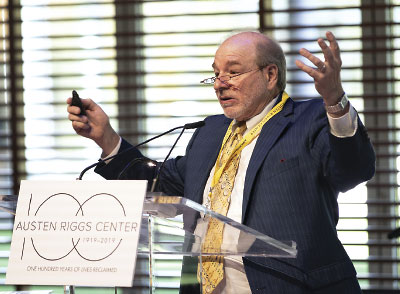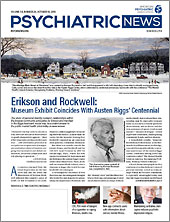The work of the Austen Riggs Center, now 100 years old, stands “at the intersection of contemporary psychoanalysis and mainstream psychiatry, psychology, social work, and nursing,” said Eric Plakun, M.D., medical director and CEO of Austen Riggs.
He was speaking at the opening of a conference last month celebrating the 100th anniversary of the center’s founding in Stockbridge, Mass., by Austen Fox Riggs, M.D. Plakun is also APA’s Area 1 Trustee.
The conference, titled “The Mental Health Crisis in America: Recognizing Problems, Working Toward Solutions,” featured keynote speakers Thomas Insel, M.D., former director of the National Institute of Mental Health; Carol Gilligan, Ph.D., a renowned psychologist and ethicist; and Peter Fonagy, Ph.D., an internationally recognized expert on treatment of borderline personality disorder.
Other speakers and panelists were clinicians and researchers at Austen Riggs; APA leaders, including CEO and Medical Director Saul Levin, M.D., M.P.A., past APA President Anita Everett, M.D., and President-elect Jeffery Geller, M.D.; and attorneys involved in the recent Wit v. UBH court decision.
The conference was a celebration of the Riggs model of treatment that has survived and flourished through 10 decades, with a waiting list for admission today; and a discussion of how values that inform that model—especially the importance of relationships and community—might address problems confronting America’s mental health system.
At the heart of treatment at Riggs is psychodynamic psychotherapy four times weekly—supported by medications and other modalities—embedded within a therapeutic community. The hospital includes residential and intensive outpatient settings, with an average length of stay of about six months.
“We work with complex psychiatric patients, sometimes referred to as ‘treatment resistant,’ though we believe the resistance often lies not with our patients but in the limits of our treatments or of ourselves as clinicians,” Plakun said.
Exploring how patients function within the community at Riggs is crucial. By understanding how they relate to others—family members, peers, therapists, and other staff—patients at Riggs experience directly the importance of relationships in contributing to lasting change.
Patients are encouraged to speak as directly as possible about their experiences of each other, to enable everyone to learn about the ways they affect others. Over time as connections deepen, community members begin to care about each other and to form, sometimes for the first time, relationships that are restorative. Treatment is entirely voluntary: there are no locked doors at Riggs. “We emphasize the dignity and authority of our patients’ voices, and we ask them to balance freedom with responsibility,” Plakun said. “We believe our open doors open minds.”
The Riggs model includes treatment of underlying and comorbid conditions in the service of achieving recovery. This goal contrasts with the managed care objective of short-term crisis stabilization, whose failure—Plakun said—is evident in the public mental health crises of suicide and opioid overdose epidemics.
Though the Riggs model is unusual in intensity and length of treatment, Plakun said its core values can be translated to settings serving a broader public. He emphasized that psychodynamic psychotherapy as applied at Riggs bears little resemblance to the insular, precious, and rarified image that adheres to psychoanalysis in countless New Yorker cartoons depicting the analysand on the couch.
“This is not your grandfather’s psychoanalysis,” Plakun told Psychiatric News. “It makes little sense to foster outdated views of psychoanalysis that come from 1890, when contemporary psychoanalysis is as different from that as contemporary psychopharmacology is from 1890 psychopharmacology. We do our patients a disservice when we let bias shape our field and its recommendations.
“Much of the emerging science supports the role of environment in gene-by-environment interactions,” he continued. “However, there is evidence of bias against psychoanalysis and psychodynamic therapy and research that adversely affects how practice guidelines and textbooks are written and how research is funded.”
Moreover, he said, the cause of psychotherapy has not been helped by the tendency of competing schools of psychotherapy—cognitive behavioral, dialectical behavioral, psychodynamic, transference focused—to “shoot at each other in a circular firing squad,” Plakun said. He called for a spirit of collaboration focused on shared elements in all the psychotherapies—especially the importance of relationships—and said this was a principal reason for the formation of the APA Caucus on Psychotherapy.
Levin outlined the work that APA is doing to fight stigma and insurance discrimination against mental health professionals. And he hailed the anniversary of Riggs and the institution’s fierce insistence on patient-centered care that treats the whole person—mind, brain, and body.
“I am bullish on the vision of Austen Riggs,” he said. “Coming here reminds me of why I became a psychiatrist.” ■


